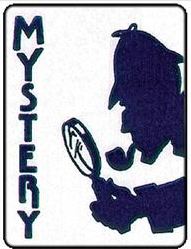Contents
099 Classification
Light Novels vs Graphic Novels
500 Notes
Canadian Creators
Short Stories
Character Note
Genres
Mystery
Science Fiction
Fantasy
Romance
Western
Assigning a Genre
Genre Notes
6XX Subject Headings
099 Classification
- Fictional works, including novels, novels in verse, novellas and short stories do not receive Dewey classification numbers.
- Instead, fictional works are simply arranged alphabetically according to main entry, labeling with the first 3 letters of the main entry as a “cutter”, see also Cuttering. E.g.
099 \\ HOO
100 1\ Hoover, Colleen.
099 \\ J COV
100 1\ Coville, Bruce.
099 \\ TEEN ARM
100 1\ Armentrout, Jennifer L.
- Other forms of literature, such as poetry, drama, essays, satire and humour and literary criticism are classified with Dewey classification numbers, see DDC.
- See also Graphic Novels.
Light Novels vs Graphic Novels
- Definition: A light novel is a style of Japanese novel primarily targeting middle and high-school students (a young adult demographic, but not exclusively). They may appear to be graphic novels based on the cover art but they are predominantly text-based with few, manga-like illustrations or "splash pages", e.g.
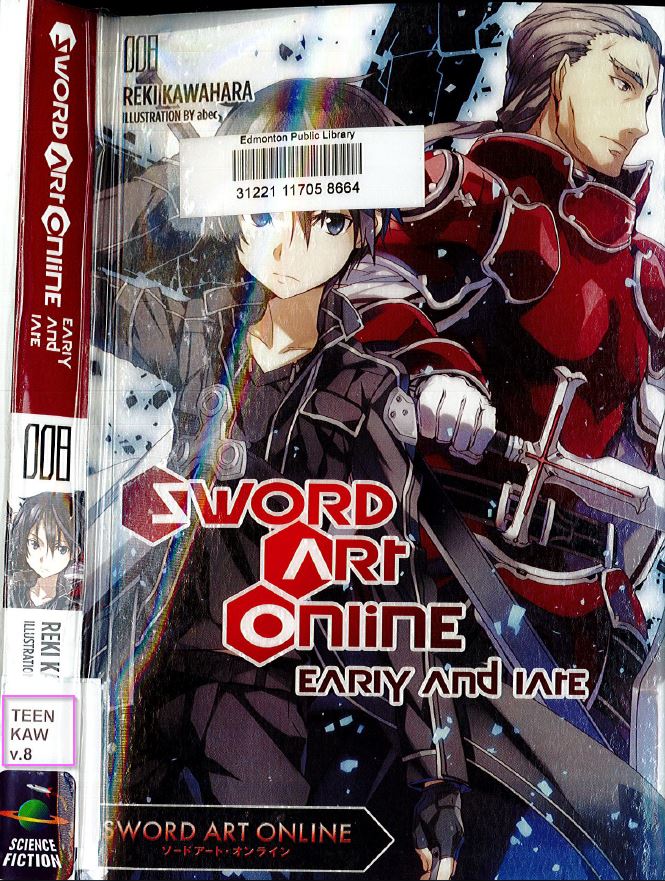

- Treat Light Novels as fiction, NOT as Graphic Novels
- Do NOT add a Graphic Novel subject heading, instead include a 655 \7 Light novels.$2lcgft heading
- Do NOT add fixed field code 6 (008|24) for Comics/Graphic novels
- Preferred access in title statement is $a. $p. $n format, NOT 490/830, e.g.
245 10 $aSword art online.$pPhantom bullet.$n006 /|cReki Kawahara ; illustration by abec ; translation by Stephen Paul.
- DO include the volume number in the call number to ensure items can be shelved in series order, e.g.
TEEN KAW v. 6
500 Notes
500 Canadian Creators
- Try to determine from item how the author wishes to be identified.
- Landed immigrants are acceptable for Canadian designation. Place of birth, part-time residence in another country may be irrelevant, e.g. Canadian living in United States, but calls himself Canadian, is a Canadian.
- Check LAC (Library and Archives Canada) authority record for information as to nationality.
- In LAC bibliographic records, a C in front of the suggested Dewey number indicates Canadian.
- Add 500 note to all fiction titles including works in world languages if it can be determined the author is Canadian and audiobook records (adult and juvenile).
500 |a Canadian creator.
- Do not add 500 note Canadian creator to Easy English titles (or reluctant reader short works in the ELL collection).
- Add note Canadian creator to 670 field in authority record where not otherwise stated.
- Circle C on "in process" form
- Make appropriate subject headings, e.g.
651 0 |a Edmonton (Alta.)|vFiction.
- Apply Canadian label for J/Teen/Adult fiction and set Item Cat 1 to CANADAFIC (home location JUVFIC, TEENCOLL, FICGENERAL or FIC[Genre]).
- For E books, apply Canadian label and set Item Cat 1 to CANADFIC (home location JUVPIC). For books in French, Item Cat 1 is set to WLFREFCAN.

Authors from Edmonton & Alberta
- For Edmonton and Albertan authors, add one or more 655 genre notes, see Local Author Headings
500 Short Stories
- For works by a single author, use a 500 note: Short stories (no subject heading is required).
- For works by a single Canadian creator (e.g. Alice Munro's Dear Life), use two 500 notes, (no subject headings are required) e.g.
500 |aCanadian creator.
500 |aShort stories.
- If the short stories by a single author are western, fantasy, etc., use a 500 note (see also 500 Genre Notes) e.g.
500 |aWestern short stories
NOT
500 |aShort stories.
- For multiple authors, add a 650 subject heading rather than a 500 note, e.g.
650 |aShort stories, American
650 |aShort stories, Canadian|zAlberta|zEdmonton.
NOT
500 |aShort stories.
- A short story label should be affixed unless a genre (western, sci-fi, mystery, etc.) label is applicable.

- For short stories of a single genre, by a single author or multiple authors, see procedures regarding genres at 500 Genres below. Use appropriate 500, 591 and 650s.
- See also: Subject Headings, Literary Form or Genre Subject Headings.
- Do not add a 500 note for Short stories to Easy English titles.
500 Character Note
- Make a 500 quoted note if there is a statement including the name of a character on a cover.
500 |a "A John Smith mystery"--Cover.
- If information is only found on a dust jacket, record in a note.
500 |a A John Smith mystery.
- If the character's name appears within a phrase on the title page, record as 245 $b other title information in original cataloguing. Vendor-supplied and derived records may be accepted as-is provided a 6XX for the character is provided if appropriate.
245 |a K is for killer : |b a Kinsey Milhone mystery . . .
- If the character, human or animal, recurs in 3 or more published titles, use a subject heading instead of a note. Headings need NOT be authorized by LC to be used. See also Subject Headings, Fictitious Characters.
650 |a Milhone, Kinsey (Fictitious character)|vFiction
500 Genres
Definitions/Hierarchy
Genre | Label | Definition |
Mystery Novels/Short Stories |
|
|
Science Fiction Novels/Short Stories |  |
|
Fantasy Novels/Short Stories | 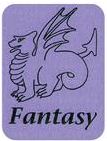 |
|
Romance Novels/Short Stories | 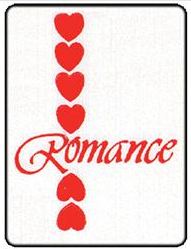 |
|
Western Novels/Short Stories | 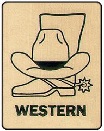 |
|
Assigning a Genre
In most cases, accept fiction genre assignment as supplied by the vendor going forward, with an exception for titles in series where EPL has always treated them as a mystery (e.g. Stephanie Plum novels by Janet Evanovich) (Jan 2025).
- Assign the appropriate genre, as defined by EPL policy, based on the plot and primary theme of the book. Note that secondary or minor themes may reflect additional genres but that the assigned genre is determined by the content. For borderline cases, consider the author’s and publisher’s intent interpreted from the book’s presentation.
- If the intended genre is not obvious, use the hierarchy below to determine the genre when there are two relatively equal genres involved.
- Generally, items having significant elements of three or more genres are not assigned a specific genre.
- Be cautious when specifying the romance genre – romance (man/woman/love/obstacle/happy ending) has to be the main reason why the book was written.
- Christian inspirational fiction titles are generally not assigned a genre since the emphasis of the book is usually on the community, the Church and the relationship to God; romance or other genres are generally of secondary importance.
- Fiction books in the same series (with a 490/830 in the record) are assigned the same genre to allow them to be shelved together; use the genre that applies to the majority of the titles in the series.
- Fiction titles with a recurring character by the same author are assigned the same genre.
- Note that exceptions may be made for any of the above “rules” as assignment of genre is title specific; also note there may be changes in our genre definitions as service point requirements may change.
- When in doubt as to genre, consult with the appropriate Collections Librarian.
- Fiction is not recatalogued for change of genre (exceptions made for titles in a series or if a fictional character is involved); see also Recataloguing guidelines.
- When a work might be a candidate for 2 (or more) genres, select according to the order above, e.g.
Mystery short stories set in the Old West should indicate in catalogue note and spine label the Mystery genre, not the Western genre or short story form.
500 Genre Notes
- Add genre notes for the following:
Genre | 500 |
Mysteries | |a A mystery novel. |
Science fiction | |a A science fiction novel. |
Fantasy | |a A fantasy novel. |
Romance | |a A romance novel. |
Westerns | |a A western novel. |
- DO use 500 genre notes for:
- Regular (soft and hardcover), and
- Large Print titles.
- Do NOT add 500 genre notes to:
- Easy English (this includes Quick Reads and similar low vocabulary/high interest series);
- World language titles (including French); for exception, see Juvenile Fiction 500 Genre notes
591 Genre Assessed Note [Use of this note discontinued Sept. 1/11]
- The 591 note “Genre assessed Month/day/year” will appear in every fiction record – the note indicates that the title has been assessed for the presence or absence of a specific genre. Add the note to every new fiction title and to every record when a duplicate is being added, or when the item is in hand for any reason.
- When a title is assessed for genre, add the 591 note to all bibliographic records having that title and include all formats except sound cassettes.
591 |a Genre assessed Feb. 1/02.
6XX Subject Headings
Last Revised: Jan. 17, 2025
